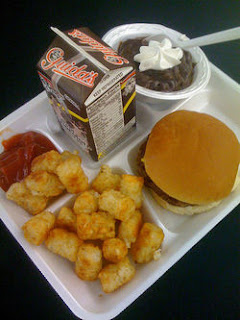Are
college and university meal plans being fair to hard-working, hungry students?
Some say no. Full time undergraduates are
having to succumb to quick fixes of harmful carbs and sugars, because sadly,
there is an abundance of the unhealthy, the deep-fried, the sweet, the savoury,
and the fluffy, as opposed to high-fibre, non-GMO foods in countless college
cafeterias nationwide.
 |
| Credits: www.uncyclopedia.wikia.com |
According to the Chef Ann Foundation, a college student’s diet tends to be a common area that suffers first and foremost when thrust in a college environment. Students begin to experience the triumphs and failures of coping with class schedules, practice hours, and the calling of extracurricular activities.
In many ways, making smart and often times appropriate decisions in terms of food choice might be a rigorous task.
University of the Cumberlands is also no stranger to any of this injustice. Students at UC are given three meal swipes per day and a choice between only two (three for dinner) dining locations on campus. Surely there must be a way to expand that number, so that almost 2,000 in-house residents have more variety when needing to fuel their bodies and minds.
Maria Ochoa is a UC junior, tennis player, Californian native, and vegan who describes the difficulty of staying healthy while competing in college level sports. “Food options are somewhat limited because there aren’t many vegans here,” says Ochoa. “Rarely there will be pasta and marinara sauce without any meat. There is always the salad bar, but trying to replenish my body as an athlete with processed junk food everywhere isn’t going to be as effective as what organic foods could do.”According to the San Francisco Gate, organic food is grown without the extra synthetic pesticides and fertilizers, and are generally thought to be safe to consume for everybody. But processed food can often times come in both the non-organic and organic form, by way of greens and vegetables even.
This process allows manufacturing companies to save on production costs, by using preservatives in foods to keep them from expiring, and sadly, cafeterias all across the nation are accepting these altered foods with open arms because, economically, they have no choice but to do so.
 |
Credits: granted4u.wordpress.com--------------------------------------------- |
More can and must be done to properly feed a nation’s growing generation.However, smaller schools with farming degrees like Warren Wilson College in Swannanoa, North Carolina have begun to plant their own meals to feed the entire student population, according to Livability.com. Despite WWC only having 850 students to UC’s 2,000 and growing, I’d still urge health fanatics and lovers of pure food alike to reason that being located in one of North America’s finest states for soil should surely count for something when asking the question of how to satisfactorily feed vegan students like Maria in Kentucky.
Apart from limiting food options for students with a different food-culture, UC's system of selling and supplying food through the student meal plan is also an aspect of student living that needs some upgrading. Students are required to eat in three specific time frames that count for breakfast, lunch, and dinner. Any meals uncalled for within these set times get deducted from the daily allowance of three swipes, or three portions.
UC sophomore and Brazilian native Leonardo Couto disagrees with this system saying, "This semester is hard for me, I have class [on Mondays, Wednesdays, and Fridays] from 12:00 p.m. to 3:00 p.m. and [the cafeteria] closes at 1:30 p.m., so I always have to miss lunch."
No comments:
Post a Comment